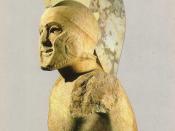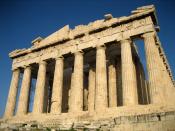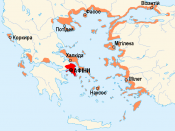In most of the ancient Greek world, gender roles were fairly static throughout time and outside circumstances had little or no influence on gender construction. Men functioned within the public sphere, whereas women were restricted to the private, domestic sphere. This was the typical gender construction of most ancient societies, and remained so in much of the world until modern times.
Unlike the women of Athens, Spartan women were taught reading, and writing, but were also expected to be able to protect themselves. Where in Athens, the education of a girl involved spinning, weaving, and other domestic arts, for a Spartan woman such tasks were relegated to the helots or perioeci. A girls education was equally as brutal as the men's, and included many athletic events such as javelin, discus, foot races, and staged battles. In many such events, Spartan women would run naked in the presence of their male counterparts, and were respected for their athletic feats.
Though women in Sparta were not subject to the same training as given by Lycurgus, Spartiate women were expected and driven to produce strong and healthy children, and to be loyal to their state. In comparison to Athens, Spartan girls were better fed their their Athenian counterparts, and were taught writing.
The role of an Athenian woman in Greek society was minimal. By comparison to present day standards, Athenian women were only a small step above slaves by the 5th century BC. Athenian women can be classified into three general classes. The lowest class was the slave women, who carried out more of the menial domestic chores, and helped to raise the children of the wife. The second class was that of the Athenian citizen woman. The third class was known as the Hetaerae. Hetaerae women were given an education in...


